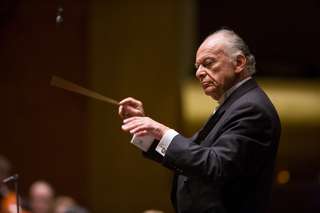|
Back
Penultimate Concert, Ultimate Sounds New York
Avery Fisher Hall, Lincoln Centre
06/17/2009 - & June 18, 20, 2009
Lorin Maazel: Monaco Fanfares, Opus 8 – Farewells: Symphonic Movement, Opus 12
Jean Sibelius: Symphony No.2 in D Major, Opus 43
New York Philharmonic Orchestra, Lorin Maazel (Music Director and Conductor) 
Lorin Maazel (© Chris Lee)
For Lorin Maazel’s penultimate concert as Musical Director of the New York Philharmonic, the first five minutes and the last five minutes were formally mirrors of each other.
Maazel’s own Monaco Fanfares, written by the conductor in 1986, when he was living in Monaco and bored to tears (or inspiration) with the hourly fanfares in front of the palace, was five minutes of repletion in the key of B flat. The repetitions in the brass or winds (no strings in the piece) encompassed one martial theme, in the same key. But like bees buzzing around a picnic lunch, Maazel made these repetitions sound different. They were radiant, dissonant, arhythmical, in perfect time, they sounded sweet or angry, but they were all repeated without stopping.
The final five minutes of the concert were the last measures of Sibelius’s overstuffed, self-indulgent, obvious yet still staggeringly powerful Second Symphony. And here the same theme was repeated, in D Major, over and over and over again, with no variation at all, save a crescendo and—naturally—the minor harmony turned to major.
Frankly, I enjoyed Maestro Maazel’s own witty work over the mighty piece by Sibelius. But it is doubtful that the conductor would agree with me.
It seems decades ago—which it was—that Mr. Maazel was known best for his allegiance to these large Romantic symphonies. He had the enthusiasm, the bravura, the temperament and probably the desire to make an audience roar with approval at the climaxes, as they did last night. But times—and the conductor himself—changed. Mr. Maazel gave up music for awhile to study philosophy and literature, he obviously realized that unthinking roars of approval aren’t quite as satisfactory as radiating the soul, and his repertory became almost mythically large.
The result of last night’s Sibelius was still gorgeous, but in a different way. Mr. Maazel, instead of playing with grandiose unifying power, was accentuating each consort of the New York Philharmonic. He allowed the great brass section to play with utmost color. He took the strings of the Phil and, especially in the final movement, turned those thick chord structures into something modal. That lovely oboe solo in the third movement was played more gracefully than I’ve ever heard it. And if the conductor slowed down the moments before the climaxes instead of letting them take their own way, he deserved the excess.
Yes, Mr. Maazel has progressed much over the years, but he can still appreciate the great Finn’s contribution.
Besides excess, Mr. Maazel also deserved to conduct his own works. He had conducted Monaco Fanfares once before in 2005, but Farewells, never heard in New York before, had been premiered by Mr. Maazel by the Vienna Philharmonic.
As mentioned before, the five-minute work, written for brass (including alto and tenor saxes) winds, chimes, bells and bass drum, was a jeu d’esprit, a romp in one key which was piquant, sharp, witty and an admirable contribution of what Maazel calls his “very cheerful music.”
Farewells, written in 1998-99, was given a program description by the composer which is far too long and involved to be quoted here. Briefly, it was “a mirror of the obtuseness of human nature, and the inhuman crunching of the machines of our own invention”, as well as being “melancholy” an argument against “the dissemination of arms of mass destruction” etc etc.
Mr. Maazel is decidedly one of the great polymaths on the dais, but his music followed, with almost Straussian literalness, those machines, their dissembling, screams of pain, waltzes undone and (in his own Zen-like words), “finally coming to rest like a pebble in nothingness.”
For those who didn’t read the libretto, the work was confusing. I tried to follow his details, but was awestruck not so much by the form as Mr. Maazel’s mastery of colors.
He did achieve those screams, the Mosolov-like machinery, the waltz, the flatulence, and an overblown but always interesting inspiration.
Mr. Maazel’s heritage will always be his conducting more than his composing. But nobody can doubt his undoubted mastery in anything he pursues.
Harry Rolnick
|